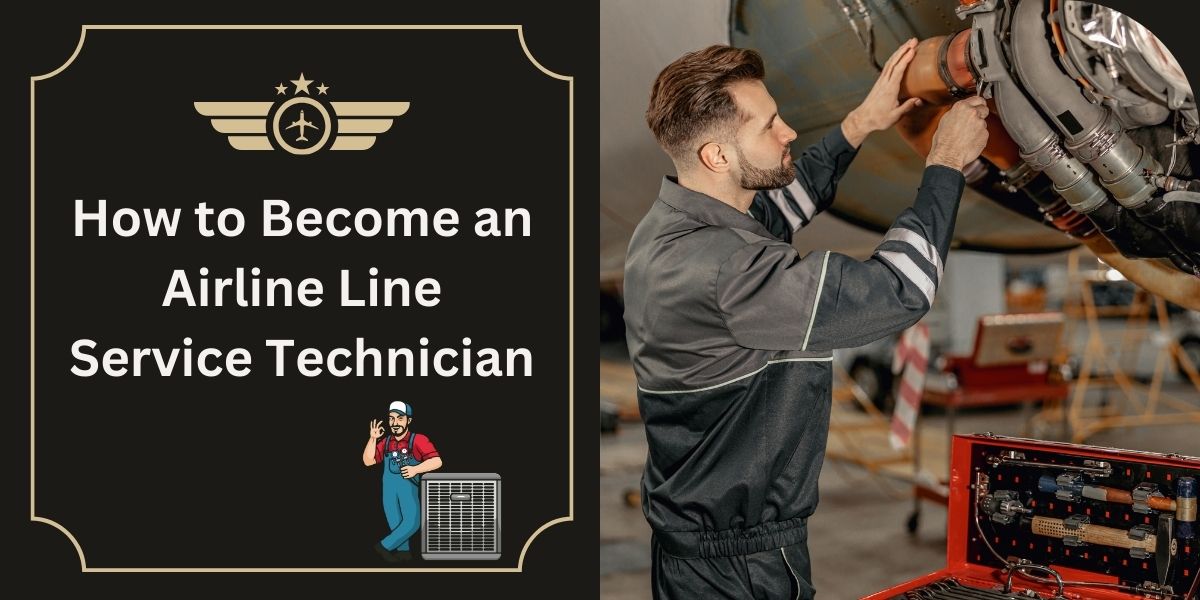An Airline Line Service Technician maintains and repairs overhead lines and electrical grids to enable the safe arrival and departure of aircraft. These experts are also employed in aviation establishments, electrical utilities, and industrial organizations to support all ground operations.
They perform refueling operations, like keeping fuel tanks ready, fueling planes when necessary, and checking for damages to fueling systems. Also, they may be tasked with turning the aircraft for take-off or parking the arriving aircraft.
In this article, we will discuss how to become a line service technician, their responsibilities, requirements, and salary.
Who is a line service technician?
A line service technician prepares aircraft for flight, services fuel and oil tanks, and assists crew and passengers with luggage and transportation requests.
As a line service technician, your job duties also include directing planes to and from the gate, checking fuel and water supplies, and handling baggage and trash removal. However, you generally do not perform repairs or check instruments on the plane like certified mechanics.
Duties and responsibilities of line service technicians?
The duties and responsibilities of an airline line service technician include:
- Greet, park, tow, move, and marshal aircraft arriving or departing the ramp area.
- Provide lavatory and water services as requested.
- Fuel/de-ice aircraft as requested.
- Provide shuttle service for passengers and crew as required.
- Assist with customer service duties as required.
- Provide oil and oxygen service for aircraft as requested.
- Assist passengers and/or crew with baggage or cargo as needed.
- Assist with the general cleaning and clearing of debris from ramps, buildings, and customer areas.
- Assist with wing-walking duties as required.
- Observe all safety, environmental, and general housekeeping rules and policies.
- May perform other duties as assigned.
What are the requirements to become a line service technician?
Here is a list of the requirements and qualifications for aspiring airline line service technicians
- High school diploma or equivalent.
- Valid driver’s license; CDL license considered a plus.
- Ability to lift up to 50 pounds.
- Ability to perform simple arithmetic.
- Availability to work flexible hours, including weekends.
Physical Demands
The physical demands described here are representative of those that must be met by an employee to successfully perform the essential functions of this job.
While performing the duties of this job, the employee is regularly required to stand, walk, use hands to finger, handle, or feel; reach with hands and arms; climb or balance; stoop, kneel, crouch, or crawl; and talk or hear.
The employee is required to regularly lift and/or move up to 50 pounds above the head. Specific vision abilities required by this job include close vision, night vision, and distance vision.
However, they are regularly exposed to moving mechanical parts, high, precarious places, fumes or airborne particles, and outside weather conditions.
The employee is frequently exposed to vibration, is occasionally exposed to toxic or caustic chemicals, and is at risk of electrical shock. The noise level in the work environment is usually very loud.
How To Become a Line Service Technician
If you want to become a line service technician, follow these six simple steps:
1. Education Requirements
You must consider how much education you need. Based on real airline line service technician resumes, 37.4% of line service technicians have a bachelor’s degree.
Regarding higher education levels, 1.2% of service line technicians have master’s degrees. Even though some service line technicians have a college degree, it’s possible to become one with only a high school degree or GED.
2. Develop Specific Skills
You need some essential line service technician skills before entering the job market. The following skills are frequently mentioned in their job descriptions:
- Ability to lift up to 50 pounds.
- Ability to perform simple arithmetic.
- Availability to work flexible hours, including weekends.
3. Complete Relevant Line Service Technician Training And Internships
During this time, new service line technicians learn the skills and techniques required for their job and employer.
4. Research Line Service Technician Duties And Responsibilities
A line service technician’s duties and responsibilities involve what they do on a typical day. Here is a list of the main duties and responsibilities that appear on their job listings:
- Manage all QC paperwork, including towbar and equipment integrity checklists.
- Manage system and application support for internal customers, including software installation and PC upgrades.
- Provide compliance information for OSHA, HazMat, MSDS, PPE, etc.
- Operate fuel trucks, tugs, baggage handling, GPUs, and grind radio equipment.
- Adhere to lockout/tag-out policy and wear all required PPE
- wheel alignment, assemble doors, check for AC leaks set headlights
5. Prepare Your Resume
When your background is strong enough, you can start writing your resume.
6. Apply For Jobs
Now it’s time to start searching for a job. Consider the tips below for a successful job search:
- Browse job boards for relevant postings
- Consult your professional network
- Reach out to companies you’re interested in working for directly
What is the salary of a line service technician?
As of January 13, 2024, the average hourly pay for a line service technician in the United States is $17.77 an hour.
While ZipRecruiter is seeing hourly wages as high as $24.04 and as low as $13.22, the majority of line service technician wages currently range between $15.87 (25th percentile) and $18.51 (75th percentile) across the United States.
The average pay range varies little (about $2.64), which suggests that regardless of location, there are not many opportunities for increased pay or advancement, even with several years of experience.
Conclusion
The path to becoming an airline line service technician is a journey filled with technical expertise, a commitment to safety, and a passion for aviation.
Aspiring individuals also looking to thrive in this role should focus on acquiring the necessary education, hands-on training, and relevant certifications.
However, with a strong foundation in aircraft maintenance, fueling procedures, and safety protocols, these technicians play a vital role in ensuring the efficient and secure operations of airline services.




 Jobi.ng
Jobi.ng



